英语学术技能及研究方法II-Academic Skills II
英语学术技能及研究方法I-Academic Skills I

• Evaluate critically, analyse and produce academic reports
Academic Culture
(new edition 2018)
pp. 103-110
Group presentation test
Week 8
Group presentation test
/
Group presentation test (continue)
Week 9
Writing essays--general-specific texts
Specify research question and tutorial
Revising students’ report
Report 1stdraft
introduction to Australian academic culture.The course is divided into 60 hours that stretch over semesters 5 and 6.
This course will teach students how to be an independent learner, work in a team, prepare for a debate, search for useful journal articles. In addition, students how to reference correctly and avoid plagiarism, take notes during lectures, conduct research, use critical thinking skills, and understand journal articles written in English.
学术英语写作与研究方法 第二版 刘承宇

学术英语写作与研究方法第二版刘承宇随着全球化的不断深入,学术英语写作与研究方法已经成为广大科研工作者必备的技能。
在这个背景下,刘承宇教授的第二版《学术英语写作与研究方法》应运而生,为广大读者提供了全面、实用的学术英语写作及研究方法指导。
本文将详细介绍这本书的主要内容,帮助读者更好地掌握学术英语写作技巧和研究方法。
一、学术英语写作篇1.写作概述本书首先对学术英语写作进行了概述,强调了学术英语写作在国际学术交流中的重要性。
刘承宇教授指出,学术英语写作不仅有助于推动我国科研成果走向世界,还能提高我国科研工作者的国际学术影响力。
2.写作步骤与技巧书中详细介绍了学术英语写作的步骤与技巧,包括选题、文献综述、研究设计、数据分析、结论与讨论等。
针对每个环节,作者都给出了实用的建议和注意事项。
3.语言表达与风格本书对学术英语写作的语言表达与风格进行了深入剖析,从词汇、句型、语法等方面提供了丰富的实例,帮助读者提升写作质量。
4.常见问题与解答针对学术英语写作中常见的问题,如语法错误、逻辑不清、论证不足等,书中给出了具体的解答和改进方法。
二、研究方法篇1.定性研究方法本书介绍了定性研究方法的基本原理、操作步骤和常用技巧。
包括访谈、观察、案例分析等,为读者提供了丰富的研究方法选择。
2.定量研究方法书中对定量研究方法进行了详细讲解,包括问卷调查、实验设计、统计分析等。
作者结合实际案例,使读者更容易理解和掌握定量研究方法。
3.混合研究方法刘承宇教授还介绍了混合研究方法,即定性与定量研究相结合的研究方法。
书中阐述了混合研究方法的优势和应用场景,为读者提供了更多研究思路。
4.研究伦理与规范本书强调了研究伦理与规范在学术研究中的重要性,对学术不端行为进行了剖析,提醒读者在研究过程中遵循学术规范,确保研究的严谨性和可靠性。
总结:第二版《学术英语写作与研究方法》为广大科研工作者提供了一本实用的学术写作与研究方法指导书。
书中内容丰富、案例详实,有助于读者快速掌握学术英语写作技巧和研究方法,为在国际学术舞台上展示自己的研究成果奠定坚实基础。
关于学术英语的英语作文
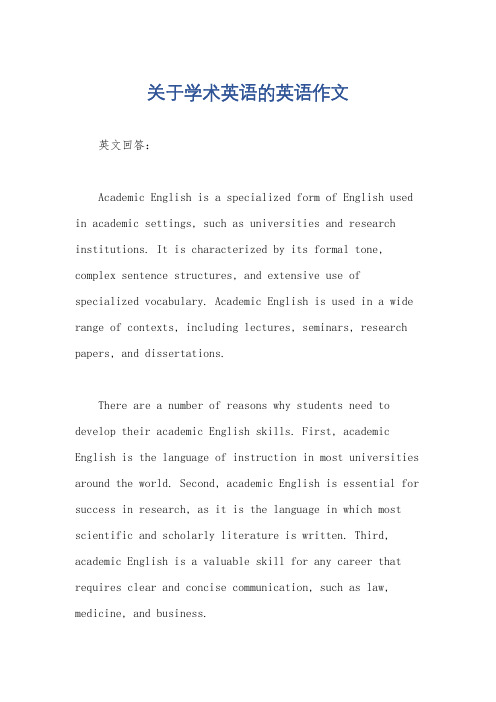
关于学术英语的英语作文英文回答:Academic English is a specialized form of English used in academic settings, such as universities and research institutions. It is characterized by its formal tone, complex sentence structures, and extensive use of specialized vocabulary. Academic English is used in a wide range of contexts, including lectures, seminars, research papers, and dissertations.There are a number of reasons why students need to develop their academic English skills. First, academic English is the language of instruction in most universities around the world. Second, academic English is essential for success in research, as it is the language in which most scientific and scholarly literature is written. Third, academic English is a valuable skill for any career that requires clear and concise communication, such as law, medicine, and business.There are a number of ways to improve your academic English skills. One important step is to read widely in academic texts. This will help you to become familiar with the vocabulary and grammar of academic English. You canalso improve your academic English skills by writing regularly. Try to write in a formal tone and use complex sentence structures. Finally, you can also take courses or workshops on academic English.中文回答:学术英语是大学和研究机构等学术环境中使用的一种专门的英语形式。
研究生学术英语读写教程unite2
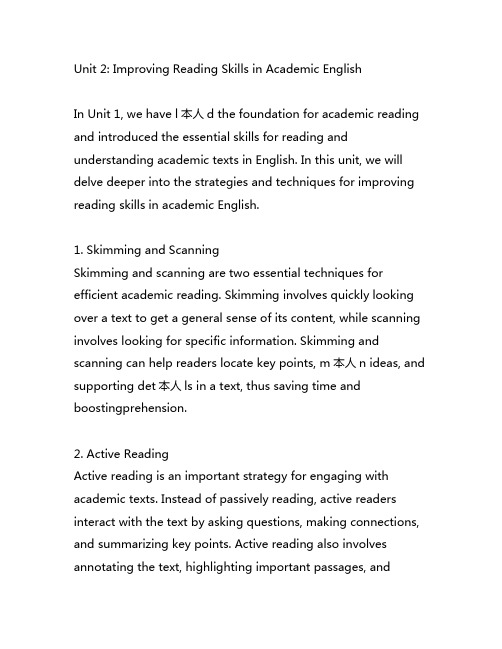
Unit 2: Improving Reading Skills in Academic EnglishIn Unit 1, we have l本人d the foundation for academic reading and introduced the essential skills for reading and understanding academic texts in English. In this unit, we will delve deeper into the strategies and techniques for improving reading skills in academic English.1. Skimming and ScanningSkimming and scanning are two essential techniques for efficient academic reading. Skimming involves quickly looking over a text to get a general sense of its content, while scanning involves looking for specific information. Skimming and scanning can help readers locate key points, m本人n ideas, and supporting det本人ls in a text, thus saving time and boostingprehension.2. Active ReadingActive reading is an important strategy for engaging with academic texts. Instead of passively reading, active readers interact with the text by asking questions, making connections, and summarizing key points. Active reading also involves annotating the text, highlighting important passages, andwriting notes in the margin. By actively engaging with the text, readers can better understand and remember the information.3. Vocabulary ExpansionA wide-ranging vocabulary is crucial for understanding academic texts. In this unit, we will focus on strategies for expanding vocabulary, such as learning academic word lists, using contextual clues, and employing vocabulary-building techniques like root analysis and word families. By continually expanding their vocabulary, students can improve their readingprehension and academic writing skills.4. Critical ReadingCritical reading involves analyzing and evaluating a text to form a deep understanding of its content and arguments. In this unit, students will learn how to develop critical reading skills, including identifying the author's purpose, evaluating evidence and reasoning, and questioning the text's underlying assumptions. Critical reading is essential for academic success as it enables students to think critically and develop their own informed opinions.5. Reading for ResearchFor graduate students, reading is not just aboutprehension—it is also about conducting research and gathering information for academic projects. This unit will introduce strategies for reading academic texts with a research mindset, including identifying relevant sources, extracting key information, and citing and referencing sources properly. Effective reading for research is essential for producing high-quality written work.6. Supplementary MaterialsIn addition to the core content of this unit, students will have access to supplementary materials such as academic articles, sample texts, and readingprehension exercises. These materials will provide additional practice and support for students to further enhance their reading skills in academic English.In conclusion, Unit 2 of the research graduate academic English reading and writing course focuses on equipping students with advanced reading skills to engage effectively with academic texts. By mastering the techniques of skimming and scanning, active reading, vocabulary expansion, critical reading, and reading for research, students will be well-prepared to navigate theplexities of academic English reading and succeed in their graduate studies and beyond.。
外研社学术英语(第二版)综合Unit 2 (教师用书U2
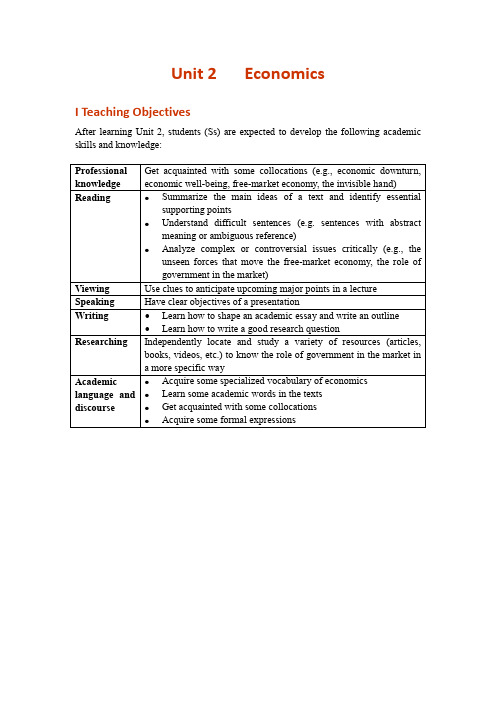
Unit 2 EconomicsI Teaching ObjectivesAfter learning Unit 2, students (Ss) are expected to develop the following academic skills and knowledge:II Teaching Activities and ResourcesReadingText ALead-inTeaching StepsAsk Ss to work in pairs and do the task in Lead-in. Then invite several Ss to share their answers with the whole class.Answer Keys1.The invisible hand.2.Our economic life is made possible by the skill and labor of vast numbers of totalstrangers.The activities of countless far-flung men and women have to be intricately choreographed and precisely timed. However, no one coordinates it, and yet they do cooperate. It’s “the invisible hand” —the mysterious power that leads innumerable people, each working for his own gain, to promote ends that benefit many. Out of the seeming chaos of millions of uncoordinated private transactions emerges the spontaneousText AnalysisTeaching Steps1.OverviewAsk Ss to preview Text A before class. Or, allocate some time for Ss to read the text quickly in class. Then invite several Ss to summarize the main idea of Text A.2.In-Depth Analysis1)Show Ss the following words and ask them to contribute to the class as muchas possible with what they know about these words. Provide additional information in Supplementary Information when necessary.•the invisible hand•free-market economy•economic downturn•An Inquiry into the Nature and Causes of the Wealth of Nations2)Explain some important language points in Language Support to Ss.3)Discuss with Ss the invisible hand in the author’s eyes by doing Task 1 inCritical reading and thinking.4)Organize a group discussion about the questions from Task 2 in Criticalreading and thinking. Encourage Ss to think independently, critically and creatively and share their ideas with each other.Supplementary Information1.free-market economyIn a free market economy, the laws and forces of supply and demand, rather than a central government, regulate production and labor. The prices for goods and services are self-regulated by buyers and sellers negotiating in an open market.Most companies and resources are not owned by the state. Instead, they are owned by private individuals or entities who are free to trade contracts with each other. 2.economic downturnAn economic downturn is a general slowdown in economic activity over a sustained period of time. It occurs when the value of stocks, property, and commodities fall, productivity either grows more slowly or declines, and GDP shrinks, stands still or expands more slowly. It can happen in a specific region (e.g.the Asian financial crisis in the late 1990s) or on a global scale (e.g. the global financial crisis in the late 2000s). The main features of an economic downturn include rising unemployment, falling share and house prices, low consumer confidence and declining investment.4.An Inquiry into the Nature and Causes of the Wealth of Nations(《国富论》)An Inquiry into the Nature and Causes of the Wealth of Nations, usually abbreviated as The Wealth of Nations, is Adam Smith’s masterpiece. It was first published in 1776, and is widely considered to be the first modern work in economics. Through reflection over the economics at the beginning of theIndustrial Revolution, the book touches upon broad topics such as the division of labor, productivity and free markets.Language Support1.Individual buyers and sellers will act according to what is in their own bestinterests. (Para. 2)The phrase “in one’s interest” means “for one’s benefit or advantage”(为了……的利益;为……着想). There are some relevant expressions, such as “in the interest of one”, “in one’s own interest”, and “in one’s best interest”.e.g. It’s obviously in their interest to increase profits.I suspect it’s in your own best interest to quit now.2.Customers are likewise typically looking out for their self-interests. (Para. 4)The word “likewise” is used to signal a comparison that explains how things are similar(同样的;此外).e.g. In this episode, we will likewise deal with another extremely commonquestion.Just water these plants twice a week, and likewise the ones in the bedroom.Other special words and expressions are often used to signal the comparison of two or more people, places, things, ideas, etc. Here are some examples of these signposts for your reference:similarly, both, just as, and also, resemble, parallel, in the same manner, inthe same way, alike, equally3.The market becomes more efficient as buyers and sellers move in the samedirection—as if directed by an invisible hand. (Para. 5)这里的as if用于省略句。
学术英语写作与研究方法(第二版)PPT Chapter 09 Entering an Academi
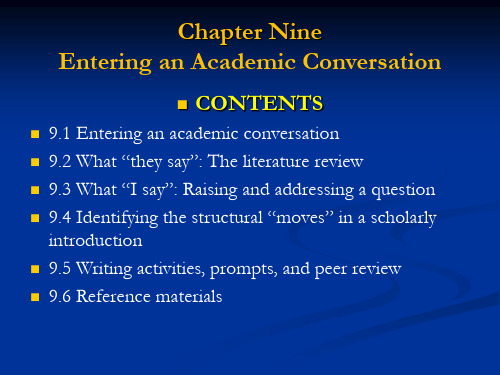
Chapter Nine Entering an Academic Conversation
CONTENTS
9.1 Entering an academic conversation 9.2 What “they say”: The literature review 9.3 What “I say”: Raising and addressing a question 9.4 Identifying the structural “moves” in a scholarly
Listening, of course, is important, and it is a good thing that you are, most likely, an accomplished listener. But you are getting ready to step into the “conversation” and say something new about the topic.
M.A.K.Halliday
Confucius
Socrates
If you are doing a study in applied linguistics, imagine that some of the most famous linguists of all time are sitting in the room, possibly including Noam Chomsky.
研究生英语II课程大纲

重点:分析作者如何采用日常活动引入话题;
分析本文章的文体特征;
难点:过渡和衔接。
听说:Chasing Copyright Piracy
语言要点:batten on sb. (sth.); yield to sth.; drop off; conjure sth. up; jab at; dab sth. on
3、Unit 4: Active and Passive Euthanasia(6学时)(理解)
重点:分析作者如何在不同思想观点的连接处使用衔接手段;
分析本文作者在表达时所采用的归纳分析法;
难点:篇章的开头与结尾。
听说:Man’s (Family AlbumUSA)
语言要点:make a case against; set out; set foot in; account for; in a … light; be subject to; have a bearing on; go along with; discriminate between
6、教材与参考书目:21世纪研究生英语系列教材
教材:研究生综合英语2,复旦大学出版社
参考书:研究生英语写作,复旦大学出版社
参考书:研究生英语翻译,复旦大学出版社出版社
参考书:走遍美国;CNN新闻
7、考核方式:闭卷考试(平时:30%;期末:70%)
8、教学环境:课堂教学
课
程
教
学
目
的
本课程在培养学生有效进行跨文化交流和学习中占据重要的位置,学生达到本课程的要求后,学生的英语应用能力能得到有效的提高,即运用英语进行听、说、读、写、译的实用能力。
学术英语词汇大全
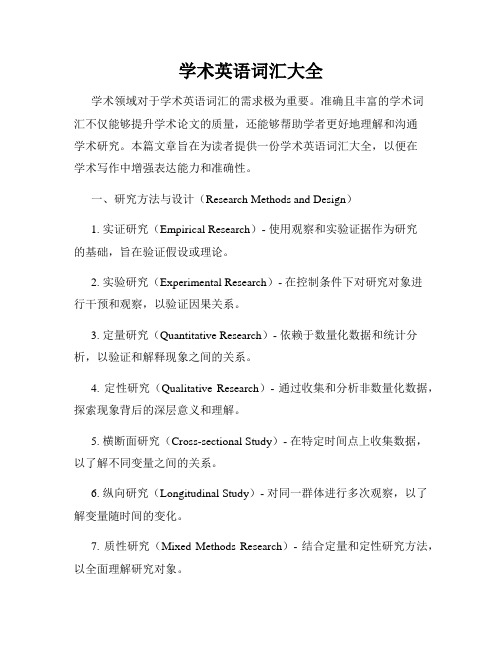
学术英语词汇大全学术领域对于学术英语词汇的需求极为重要。
准确且丰富的学术词汇不仅能够提升学术论文的质量,还能够帮助学者更好地理解和沟通学术研究。
本篇文章旨在为读者提供一份学术英语词汇大全,以便在学术写作中增强表达能力和准确性。
一、研究方法与设计(Research Methods and Design)1. 实证研究(Empirical Research)- 使用观察和实验证据作为研究的基础,旨在验证假设或理论。
2. 实验研究(Experimental Research)- 在控制条件下对研究对象进行干预和观察,以验证因果关系。
3. 定量研究(Quantitative Research)- 依赖于数量化数据和统计分析,以验证和解释现象之间的关系。
4. 定性研究(Qualitative Research)- 通过收集和分析非数量化数据,探索现象背后的深层意义和理解。
5. 横断面研究(Cross-sectional Study)- 在特定时间点上收集数据,以了解不同变量之间的关系。
6. 纵向研究(Longitudinal Study)- 对同一群体进行多次观察,以了解变量随时间的变化。
7. 质性研究(Mixed Methods Research)- 结合定量和定性研究方法,以全面理解研究对象。
二、文献综述和理论框架(Literature Review and Theoretical Framework)1. 学术论文(Academic Paper)- 详细描述研究问题、方法、结果和结论的学术文章。
2. 文献综述(Literature Review)- 对已有文献进行全面评估和分析,以支持研究问题和方法的选择。
3. 引用文献(Citation)- 在学术论文中使用其他作者的观点、理论或研究结果时,提供出处和参考文献列表的方法。
4. 理论框架(Theoretical Framework)- 在学术研究中构建理论模型或概念框架,以解释和解决研究问题。
新时代研究生学术英语综合教程2第三单元

如何提高学术英语写作能力
学术英语写作能力是研究生必备的一项技能。
无论是在学术论文的写作还是在学术交流中,学术英语写作能力都是至关重要的。
以下是一些提高学术英语写作能力的方法和技巧:
1. 多阅读:阅读是提高学术英语写作能力的基础。
通过阅读英文学术论文和学术期刊,可以学习到各种学术写作的规范和技巧。
同时,阅读可以帮助你积累词汇和语法知识,提高语感和语言表达能力。
2. 多写作:写作是提高学术英语写作能力的关键。
通过不断地写作,可以锻炼你的写作能力和思维逻辑。
建议在写作过程中多注意结构和语言的规范性,以此来提高学术英语写作能力。
3. 多模仿:模仿是提高学术英语写作能力的有效方法之一。
在写作过程中,可以模仿学术论文的写作风格和语言表达方式,以此来提高自己的学术英语写作能力。
4. 注重细节:学术英语写作能力的提高需要注重细节。
在写作过程中,要注意语法、拼写和标点等方面的细节,以此来提高学术英语写作能力。
5. 寻求帮助:如果遇到学术英语写作方面的问题,可以寻求帮助。
可以向导师、同学或英语教师等人寻求建议和指导,以此来提高学术英语写作能力。
提高学术英语写作能力需要不断地学习和练习。
通过以上方法和实践,可以提高自己的学术英语写作能力,为研究生学术生涯打下坚实的基础。
新时代研究生学术英语综合教程2第四单元

新时代研究生学术英语综合教程2第四单元The field of academic English for graduate students has become increasingly important in the new era as the globalization of higher education and research has led to a greater need for effective communication and collaboration across linguistic and cultural boundaries. The fourth unit of the "New Era Graduate Academic English Integrated Course 2" aims to equip students with the necessary skills and strategies to navigate the complex landscape of academic writing and presentation in English.One of the key focuses of this unit is the development of critical thinking and analytical skills. Graduate students are expected to engage in in-depth research and analysis, and the ability to think critically and formulate well-reasoned arguments is essential for success in academic endeavors. The course materials in this unit provide students with a solid foundation in critical reading and writing, teaching them how to identify and evaluate the underlying assumptions and biases in academic texts, as well as how to construct their own persuasive and well-supported arguments.Another important aspect of this unit is the emphasis on academic writing conventions and styles. Graduate-level writing in the English language requires a high level of proficiency in areas such as grammar, syntax, and vocabulary, as well as a strong understanding of the specific rhetorical structures and formatting requirements of academic genres such as research papers, literature reviews, and dissertations. The course materials in this unit cover a range of writing strategies and techniques, including effective organization, coherence, and cohesion, as well as the appropriate use of citations and references.In addition to written communication, this unit also addresses the skills required for effective oral presentations in academic settings. Graduate students are often called upon to present their research findings and ideas to their peers and faculty members, and the ability to deliver clear, concise, and engaging presentations is crucial for success in these situations. The course materials in this unit provide students with guidance on topics such as presentation structure, visual aids, and delivery techniques, as well as strategies for handling questions and engaging with the audience.One of the unique features of this unit is its focus on the cultural and linguistic diversity of the graduate student population. Many graduate programs, particularly in the sciences and engineering fields, attract students from a wide range of cultural and linguisticbackgrounds, and navigating the academic landscape in a non-native language can present significant challenges. The course materials in this unit address these challenges by providing students with insights into the cultural norms and expectations of the English-speaking academic community, as well as strategies for overcoming language barriers and effectively communicating their ideas to an international audience.Throughout the unit, students are encouraged to engage in hands-on, collaborative learning activities that allow them to apply the concepts and strategies they have learned to real-world academic scenarios. This includes peer review exercises, group discussions, and simulated presentation scenarios, all of which are designed to help students develop the practical skills and confidence they need to succeed in their academic pursuits.Overall, the fourth unit of the "New Era Graduate Academic English Integrated Course 2" represents a comprehensive and multifaceted approach to preparing graduate students for the challenges and demands of academic communication in English. By fostering critical thinking, analytical skills, and proficiency in written and oral communication, this unit equips students with the tools they need to thrive in the increasingly globalized and competitive world of graduate-level research and scholarship.。
理工专业通用学术英语基础篇

理工专业通用学术英语基础篇学术英语是指用于学术交流的英语语言,包括学术写作、学术讲演等。
对于理工专业的学生来说,掌握学术英语非常重要,因为它是参与国际学术界交流的桥梁。
下面是理工专业通用学术英语的基础篇:1. 科研报告 (Research Presentation)- Good morning/afternoon everyone. Today, I would like to present my research on…- The purpose of my study is to investigate/examine/analyze…- The findings/results of my research indicate/suggest/demonstrate that…- In conclusion, my research contributes to the field of… and provides insights into…2. 学术论文 (Academic Paper)- This paper aims to explore/investigate/a nalyze the impact of…- The methodology used in this study includes…- The results of the experiment/survey indicate/reveal that…- Based on the findings, it can be concluded that…- This study contributes to our understanding of…3. 文献综述 (Literature Review)- This literature review examines/evaluates/analyzes previous studies on…- The main findings of these studies indicate that…- However, some limitations/challenges exist in the current research.- Future research should focus on/address the gaps in the literature.- In conclusion, this literature review provides a comprehensive overview of…4. 研究方法 (Research Methods)- This study adopts/utilizes a quantitative/qualitative research approach.- The sample/participants in this study were selected using a random/snowball sampling method.- Data was collected through interviews/surveys/experiments.- Statistical analysis/Content analysis was applied to analyze the data.- The limitations of the research methodology should be acknowledged.5. 结果与讨论 (Results and Discussion)- The results of the study suggest that there is a positive/negative correlation between A and B.- The findings support the hypothesis/theory that was proposed.- These results are consistent with previous studies/research in the field.- The implications of these findings for theory/practice are discussed.- Future research should focus on further validating/exploring the results.以上是理工专业通用学术英语基础篇的一些常用表达和句型,可以帮助学生在学术交流和学术写作中更加准确和流利地表达自己的观点和研究成果。
实用英语技能检定2级资格

实用英语技能检定2级资格Passing the Practical English Proficiency Test Level 2 is a milestone for many learners. It signifies a solid grasp of the language's essentials, enabling communication in everyday situations.The test focuses on four key areas: listening, speaking, reading, and writing. Each section is designed to evaluatethe candidate's ability to understand and use English in a practical context.Listening comprehension is crucial for grasping spoken English. It involves understanding conversations, news broadcasts, and presentations, which are vital for both personal and professional interactions.Speaking skills are assessed through role-plays and discussions. This part of the test ensures that candidatescan express their thoughts clearly and engage in meaningful dialogues.Reading proficiency is tested through a variety of texts, from simple narratives to more complex articles. It is essential for understanding written information and instructions.Writing skills are evaluated through tasks such as emails, summaries, and essays. This demonstrates the ability toconvey information in a clear, concise, and grammatically correct manner.Preparing for the Level 2 exam involves consistent practice and exposure to the language. Engaging in conversations, reading widely, and writing regularly are key components of effective preparation.The certification not only boosts confidence but also opens doors to further educational and career opportunities. It is a stepping stone to higher levels of English proficiency.In conclusion, the Practical English Proficiency Test Level 2 is a valuable qualification for those seeking to validate their English language skills. It is a testament to one's ability to communicate effectively in an English-speaking environment.。
《学术英语I》-课程教学大纲

《学术英语I》课程教学大纲一、课程基本信息课程代码:16133102课程名称:学术英语I英文名称:Academic English I课程类别:通识课学时:32学分:2适用对象: 金融学中外联合培养项目班级考核方式:考试先修课程:商务英语阅读II,商务英语写作II二、课程简介《学术英语I》专门针对广东财经大学中外人才培养实验班二年级学生开设的大学英语系列改革课程之一。
该课程是一门桥梁课程,旨在提高中国学生的学术研究与论文写作能力,帮助他们为接下来的留学学习做好准备。
该课程以学术研究与论文写作各环节和分项技能的训练为纲,帮助学生培养良好的学术研究和写作习惯,并且注重技能的巩固和整合,强调学以致用。
同时,课程注重中西结合,在学术阅读和写作中加强爱国主义教育,增加学生文化自信,培养学生批判性思维,使之既要继承中华优秀传统文化又要弘扬时代精神,既要立足本国又要面向世界,即把中华传统文化以及现代文化的创新成果继承下来,传播出去,发扬光大,最终促使他们成为向世界介绍中国、传播中华文化且具有国际视野的高端双语复合型人才。
该课程教学采取以学生为中心, 教师讲授为引导,学生阅读训练以及主题讨论为辅助的模式;将面授与机助学习,课内讲授和课后自主学习紧密结合起来。
课堂教学采用外语教学与研究出版社引自的Garnet Education的经典学术英语教材《学术研究与论文写作》和《学术英语阅读》。
本课程的教学评估包括形成性评估和终结性评估。
Academic English I is one of the series of College English reform courses for students of grade two in Sino-foreign talent training experimental classes of Guangdong University of Finance and Economics. The course is a bridge course designed to improve students’ability of doing research and writing thesis and to prepare them for their oncoming study abroad. It aims at supporting students in developing extended writing and research skills, focusing on the consolidation and integration of the sub-skills, and emphasizing the application of knowledge in the process of doing research and extended writing.The teaching consists of lectures by the teacher, in-class and out-of-class reading and discussing. The main textbook is Garnet Education's classic academic English textbooks: Extended Writing and Research Skills & Reading English for Academic Study published by Foreign Language Teaching and Research Press. Both formative assessment and summative assessment will be adopted.三、课程性质与教学目的《学术英语I》是一门通识必修课,其主要目的是为我校中外人才培养实验班同学提供系统学习学术研究与论文写作各环节和分项技能,帮助学生培养良好的学术研究和写作习惯,并且注重各种技能的巩固和整合。
英语写作与学术研究方法

英语写作与学术研究方法The field of English Writing and Academic Research Methods is of great importance in fostering effective communication and conducting scholarly investigations. In this article, we will explore various aspects of this discipline and discuss the methods that can enhance English writing and academic research.1. IntroductionWriting in English is a fundamental skill required for academic and professional success. Besides, understanding how to conduct reliable and rigorous research is crucial for scholars in various disciplines. Therefore, mastering both English writing and academic research methods is essential for anyone aiming to excel in their academic pursuits.2. Developing English Writing Skills2.1. Grammar and VocabularyA strong command of grammar and vocabulary is essential for effective English writing. Practicing grammar exercises and expanding one's vocabulary through reading and vocabulary-building activities can significantly enhance writing skills.2.2. Organization and StructureWell-structured and organized writing is crucial to convey ideas clearly. Using appropriate paragraph structures and adopting a logical flow of ideas can greatly improve the overall coherence of the text.2.3. Clarity and ConcisenessClear and concise writing helps readers understand the intended message without confusion. Avoiding excessive wordiness and using simple, straightforward language aid in achieving clarity and conciseness in writing.2.4. Proofreading and EditingThorough proofreading and editing are vital to eliminate errors and improve the overall quality of the written work. Reviewing the text for spelling, grammar, and punctuation errors ensures the final piece is polished and professional.3. Academic Research Methods3.1. Conducting Literature ReviewsA literature review involves an in-depth analysis of existing scholarly works related to a specific research topic. It helps identifygaps in the existing literature and provides a foundation for the researcher's own study.3.2. Formulating Research QuestionsTo conduct effective research, formulating clear and focused research questions is crucial. Research questions guide the entire study, and they should be specific, measurable, attainable, relevant, and time-bound (SMART).3.3. Collecting and Analyzing DataData collection methods depend on the nature of the research. Surveys, interviews, observations, and experiments are common ways to gather data. Once collected, the data must be analyzed using appropriate statistical or qualitative analysis techniques.3.4. Writing Research PapersWriting a research paper involves organizing and presenting the research findings in a structured and coherent manner. The paper should include an introduction, literature review, methodology, results, discussion, and conclusion sections. Adhering to proper citation and referencing styles is essential to give credit to the original sources.4. ConclusionMastering English writing and academic research methods is crucial for anyone pursuing academic or professional goals. By developing strong writing skills and adopting rigorous research methods, individuals can effectively communicate their ideas and contribute to their respective fields of study. Continuous practice, combined with a commitment to learning, will undoubtedly lead to success in English writing and academic research.。
academic用法及固定搭配
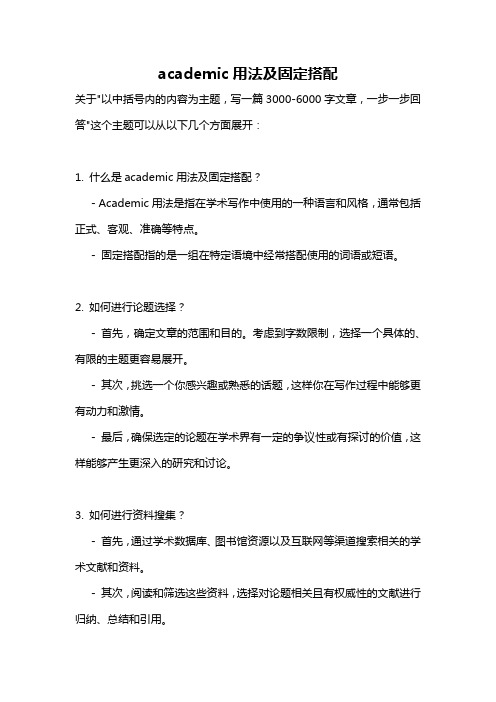
academic用法及固定搭配关于"以中括号内的内容为主题,写一篇3000-6000字文章,一步一步回答"这个主题可以从以下几个方面展开:1. 什么是academic用法及固定搭配?- Academic用法是指在学术写作中使用的一种语言和风格,通常包括正式、客观、准确等特点。
- 固定搭配指的是一组在特定语境中经常搭配使用的词语或短语。
2. 如何进行论题选择?- 首先,确定文章的范围和目的。
考虑到字数限制,选择一个具体的、有限的主题更容易展开。
- 其次,挑选一个你感兴趣或熟悉的话题,这样你在写作过程中能够更有动力和激情。
- 最后,确保选定的论题在学术界有一定的争议性或有探讨的价值,这样能够产生更深入的研究和讨论。
3. 如何进行资料搜集?- 首先,通过学术数据库、图书馆资源以及互联网等渠道搜索相关的学术文献和资料。
- 其次,阅读和筛选这些资料,选择对论题相关且有权威性的文献进行归纳、总结和引用。
- 还可以与专家学者进行交流,参与学术研讨会或研究项目,以获取更多的资料和观点。
4. 如何进行论文结构的规划?- 引言:介绍选定的主题,提出研究问题和目的,并概述整篇论文的结构和核心观点。
- 文献综述:回顾相关文献,分析前人研究的现状和不足之处,为本研究的意义和创新提供依据。
- 研究方法:详细描述和解释所采用的研究方法和数据收集方式,确保研究的可信度和有效性。
- 结果与讨论:客观地呈现研究结果,并通过分析和解释揭示其背后的原因和现象,展开学术探讨。
- 结论:总结整篇论文的主要发现和观点,指出研究的局限性并提出今后的研究方向和建议。
5. 如何进行写作过程?- 制定写作计划:设定每天或每周的写作目标,避免拖延并保持连贯性。
- 分段写作:按照论文结构的规划,逐步完成各个部分的写作。
- 多次修改:反复检查和修改文章,确保逻辑清晰、表达准确,避免语法和拼写错误。
- 注意文体和语气:使用学术语言和规范,避免口语化和主观情感的表达。
英语学术论文写作技巧academic writing skills(全英文版)
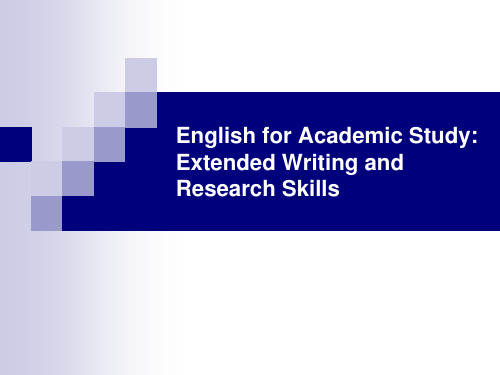
Extended writing at university: Why do students write?
The reasons why students carry out extended academic writing activities may include: to develop and express their ideas; to provide evidence to support their ideas; to dispute or support existing theories; to display knowledge.
a) Read the first draft. b) Edit the draft --- decide objectively whether your ideas have been expressed clearly. c) Think of a working title for the project. d) Search for relevant journals/books/information in the library and on the Internet. e) Write down the details of your sources. f) Decide if you need to do more reading. g) Write the contents page, bibliography, title page and abstract. h) Arrange a tutorial with your tutor. i) Do some reading. j) Decide on a topic. k) Write the first complete draft. l) Highlight/take notes of relevant information. m) Plan the contents in detail. n) Work on establishing a clear focus. o) Make a rough outline plan of your ideas. p) Check that sources are available/accessible.
- 1、下载文档前请自行甄别文档内容的完整性,平台不提供额外的编辑、内容补充、找答案等附加服务。
- 2、"仅部分预览"的文档,不可在线预览部分如存在完整性等问题,可反馈申请退款(可完整预览的文档不适用该条件!)。
- 3、如文档侵犯您的权益,请联系客服反馈,我们会尽快为您处理(人工客服工作时间:9:00-18:30)。
The students should finish Academic Skills I and achieve about IELTS 6.0
Intended Learning Outcomes
Upon completion of the Academic Skills Program (ASP), students will be able to:
Individual presentation assessment (continue)
Week 8
Critical thinking in Debate
Cloudcampus DEP resources
Week 9
Debate rehearsal
/
Week 10
Debate test
/
Debate assessment
• Communicate oral and written arguments and ideas effectively and articulately.
• Conduct research in a conventional and efficient manner, and understand the concept of plagiarism
Pp.157-175
Week 2
Critical thinking in research report
Academic Culture
(new edition 2018)
pp. 158-160
Report final version submission
Week 3
Individual Presentation introduction
Cloudcampus--DEP resources
Week 4
Presentation structure
Voice in presentation
Academic Culture
(new edition 2018)
pp. 79-81
Week 5
Statistics summary and expression in presentation
Week 11
Note-taking listening introduction
Oxford EAP
pp. 21-23
Week 12
Recognize and note down cause and effect relations in a lecture
• Demonstrate the concept and value of a clear, logical, and sound argument - both in writing and speaking
• Evaluate critically, analyse and produce academic reports
Cloudcampus Resources--DEP
Week 6
Presentation tutorial and test
Cloudcampus DEP resources
Individual presentation assessment
Week 7
Introduction of Debate
Cloudcampus DEP resources
Importantly, this course will help students integrate into academic culture. Overall, the skills taught in this course will allow students to express their own voices in a formal academic manner.
Learning Schedule
Week
Topic
CloudcamΒιβλιοθήκη us and Textbook Focus
Assessment
Week 1
Course Introduction
Research report finalization
Cloudcampus--DEP resources
Academic culture
introduction to Australian academic culture.The course is divided into 60 hours that stretch over semesters 5 and 6.
This course will teach students how to be an independent learner, work in a team, prepare for a debate, search for useful journal articles. In addition, students how to reference correctly and avoid plagiarism, take notes during lectures, conduct research, use critical thinking skills, and understand journal articles written in English.
Syllabus ofMathematics and Applied Mathematicsat Haide College
Academic Skills II
Description
This Academic Skills Program (ASP) is designed to provide both a comprehensive and critical
• Understand the expectations of Australian academia within its cultural contexts
• Develop the skills needed to become effective learners at university, both nationally and internationally.
